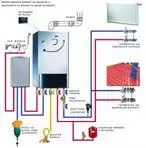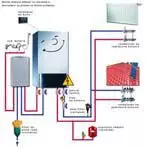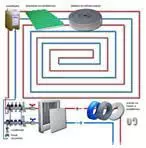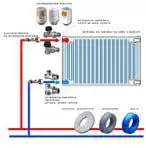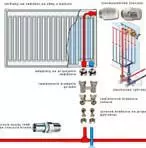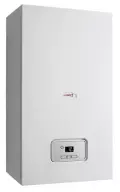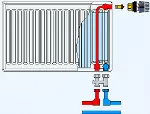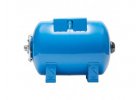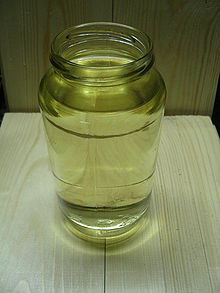Gasoline
Gasoline
Gasoline is a liquid mixture of volatile hydrocarbons (mainly alkanes, cycloalkanes, aromatic hydrocarbons and alkenes) separated from crude oil and other additives (most often benzene and isooctane) that improve its properties as fuel. The usual number of carbon atoms in the individual hydrocarbon molecules forming the basis of the mixture is between 5 and 12.
Gasoline is used as fuel for most petrol engines. It is most often produced by fractional distillation from crude oil.
Other properties
Evaporation rate and fractional composition
These properties are expressed by the distillation curve - the dependence of the vaporized proportion of fuel on temperature.
the temperature of the start of distillation (evaporation of 10% of the fuel) should not be higher than 80 °C, to ensure good engine startability
the temperature of the center of the distillation curve (evaporation of 50% of the fuel) should not be higher than 105 °C, to ensure that the engine operating temperature is quickly reached
the temperature of the end of distillation (evaporation of 90% of the fuel) should not be higher than 190 °C, to avoid condensation of heavy fractions on the internal surfaces of the engines
Evaporative heat
The heat of vaporization of gasoline depends on the boiling point temperature and the density. It ranges from 315 to 335 kJ.kg-1. Gasoline with a higher vaporization heat cools the intake mixture more, which enables better filling of the engine cylinders.
Resistance to detonation combustion
This property of gasoline is described by the octane number. The higher the value of the number, the more gasoline can be used for engines with a higher compression ratio (higher power, higher efficiency). The octane number depends on the components of the fuel. Alkanes have the least resistance to detonations, aromatic hydrocarbons the most. The resistance of fuels can be increased:
by mixing fuels of different octane levels,
by adding anti-knock additives.
Ingredients
A small amount of additives are added to gasoline, the so-called additives that improve their properties or perform another function.
The following additives are usually added to gasoline:
ethanol to limit the storage time (reduces the life of the engine but prevents long-term storage, which prevents buying "for stock" and price speculation. This prevents the possibility of storing gasoline for a time when its price will be several times higher than the motivation to switch to electric vehicles, For production a liter of ethanol is consumed in total in the process from growing, transporting and processing to mixing it into gasoline, so the overall ecological benefit is rather negative, even considering the use of arable land. This additive can be called "political-economic" and elsewhere than in not used in Europe)
for cleaning the suction tract
against gasoline aging
against gasoline freezing (pure gasoline (without the addition of ethanol) freezes at a temperature below -40 degrees. In proportion to the addition of ethanol, storage (longer-term non-driving) creates a water component in the gasoline-ethanol mixture, and the bottom of the tank can freeze already at temperatures around -5 degrees E10, -25 degrees E5)
against corrosion
against the accumulation of static electricity
dyes (Color differentiation. Ethanol is not added to gasoline intended for the military due to the reduction of engine life (among others, an internal study at VVTŠ L. Mikuláš) and mainly due to the need for long-term storage in so-called NZ. This gasoline is colored for identification and its use it is prohibited in the civil sector.)
to increase resistance against detonations.














